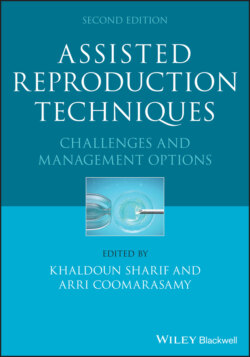Читать книгу Assisted Reproduction Techniques - Группа авторов - Страница 20
Management options Breast cancer
ОглавлениеBreast cancer is the most common malignancy in women, affecting one in eight women. Breast cancer is a multifactorial disease; however, most breast cancers are hormone‐dependent [5]. Compared with a normal menstrual cycle, estradiol concentration increases up to tenfold in ovulation stimulation cycle [6]. Therefore, the effect of subfertility and its treatment on breast cancer is widely investigated in the literature. The association between polycystic ovary syndrome (PCOS) and breast cancer has been examined in several studies. Meta‐analysis showed that PCOS does not increase the risk of breast cancer [7, 8].
As for fertility drugs and breast cancer risk, some studies showed no association while others demonstrated a possible increase in risk [9–12]. An Australian study (n = 21,025) showed commencing IVF treatment at a young age (less than 24 years of age) is associated with an increased rate of breast cancer [13]. It is expected that, if ovulation induction per se causes breast cancer, such tumors may have distinct characteristics such as strong estrogen receptor expression, but a study showed that breast cancer diagnosed within the first 2 years following infertility treatment is similar in tumor characteristics such as tumor size and histological types, estrogen receptor, progesterone receptor and Her2/Neu expression status compared to those occurring in patients without prior infertility treatment [14].
Women with BRCA1 or BRCA2 mutation have an increased risk of breast cancer. A study of 1,550 BRCA1 and 964 BRCA2 mutation carriers did not show any evidence that ovarian stimulation for IVF increases the breast cancer risk in BRCA1/2 mutation carriers [15]. A large UK‐based data linkage cohort study of 255,786 women did not find an increase in the overall risk of breast cancer but a small increase in the risk of in situ breast cancer was reported [16]. A meta‐analysis of eight cohort studies showed IVF treatment does not increase the breast cancer risk [17]. A total of seven systematic reviews or meta‐analyses evaluated the relationship between fertility drugs and breast cancer []. They have either shown no increase in the risk of breast cancer or a decrease in risk following infertility treatment. Therefore, as per the American Society of Reproductive Medicine guideline, women could be reassured that fertility drugs are not associated with an increased risk of breast cancer [24].
